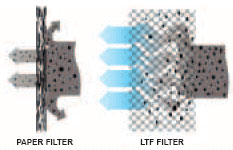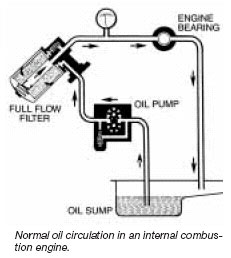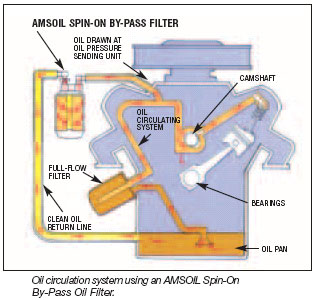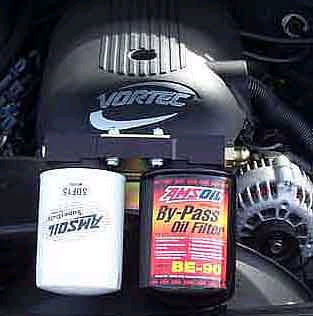|
Engine Filtration
Engine Wear
Automotive experts agree dirt is the number one cause of engine wear.
Analysis by Federal-Mogul Corporation reports that 43.4 percent of all
engine bearing distress is caused by dirt. Engine dirt particles are so
small – mere dust specks – and an engine is a highly sophisticated piece of
machinery, crafted from the most durable metal alloys. How, then, can these
minute particles bring down such a high-tech giant?
The answer lies in the fact that dirt particles are extremely abrasive. They
consist of razor-like flakes of road dust and airborne grit drawn into the
engine through the intake manifold, as well as manufacturing scarf and wear
metal particles generated inside the engine. These particles are carried by
the oil into the precision clearances between bearings and other moving
parts. Once they work in between these parts, they grind and gouge surfaces,
altering clearances and generating more abrasive debris. This wear cycle
continues, making precision components sloppy and fatigued until they fail
altogether.
Filtration is the key to preventing costly engine repairs caused by dirt.
Filtration removes contaminants by trapping and holding them outside the
system of oil circulation. In order for a filter to be truly effective, it
must be able to capture contaminants of all types and sizes. AMSOIL has
developed a complete line of sophisticated filtration products designed to
offer the best protection available against virtually all harmful engine
contaminants.
Air Filtration
 An
engine “breathes” air to mix with fuel for combustion – about 9,000 gallons
of air for every gallon of gas. All that air contains more than 400 tons of
suspended dirt in one cubic mile over a typical city, and the concentration
is much higher in rural areas where travel frequently is over unpaved roads.
The air filter is the first line of defense against the abrasive airborne
grit that gets into an engine. In order to do the job right, the air filter
must effectively filter the dangerous particles without obstructing the
vital flow of air that sustains the engine. Conventional air filters quickly
become obstructed with dirt, reducing vital engine air intake, leading to
poor engine performance and low fuel efficiency. They require frequent
replacement. An
engine “breathes” air to mix with fuel for combustion – about 9,000 gallons
of air for every gallon of gas. All that air contains more than 400 tons of
suspended dirt in one cubic mile over a typical city, and the concentration
is much higher in rural areas where travel frequently is over unpaved roads.
The air filter is the first line of defense against the abrasive airborne
grit that gets into an engine. In order to do the job right, the air filter
must effectively filter the dangerous particles without obstructing the
vital flow of air that sustains the engine. Conventional air filters quickly
become obstructed with dirt, reducing vital engine air intake, leading to
poor engine performance and low fuel efficiency. They require frequent
replacement.
Oil Filtration
 Full-flow
oil filters install directly into the line of oil circulation. The “full-
flow” of oil passes through the filter as the oil journeys between the oil
pump and the engine. A full-flow filter must be able to remove and hold
contaminants without obstructing oil flow to the engine. Most filters on the
market compromise the filtration of finer particles by using a thin layer of
porous filter paper. These filters have almost no extended cleaning ability
since they have a low capacity for storing dirt. These “surface-type” paper
filters quickly become restricted as debris builds up on the paper surface.
When this happens, the filter by-pass valve opens and allows unfiltered oil
into the engine. Full-flow
oil filters install directly into the line of oil circulation. The “full-
flow” of oil passes through the filter as the oil journeys between the oil
pump and the engine. A full-flow filter must be able to remove and hold
contaminants without obstructing oil flow to the engine. Most filters on the
market compromise the filtration of finer particles by using a thin layer of
porous filter paper. These filters have almost no extended cleaning ability
since they have a low capacity for storing dirt. These “surface-type” paper
filters quickly become restricted as debris builds up on the paper surface.
When this happens, the filter by-pass valve opens and allows unfiltered oil
into the engine.
By-Pass Oil Filtration
 An
average full flow filter traps particles as small as 20 microns. The filter
can’t remove finer particles because the oil must be filtered quickly while
removing most of the particles in the oil. However, particles in the 5 to 20
micron range cause up to 60 percent of all engine wear. Not only does the
AMSOIL By-Pass Oil Filter trap particles in the 5 to 20 micron range, it
traps particles significantly smaller. An
average full flow filter traps particles as small as 20 microns. The filter
can’t remove finer particles because the oil must be filtered quickly while
removing most of the particles in the oil. However, particles in the 5 to 20
micron range cause up to 60 percent of all engine wear. Not only does the
AMSOIL By-Pass Oil Filter trap particles in the 5 to 20 micron range, it
traps particles significantly smaller.
Unlike the full-flow filter, a by-pass filter is attached outside the main
line of oil circulation. The by-pass filter taps into the main line,
bleeding off and cleaning only a portion of the oil at any one time. It
retains the oil longer and does a thorough job of removing contaminants
without the worry of obstructing oil circulation. Because the AMSOIL By-Pass
Filter traps even the smallest of particles, it leaves oil analytically
clean and free from harmful dirt particles. Although the AMSOIL By-Pass
Filter draws only about 10 percent of the oil in the system at one time, it
will filter all the oil in a six-quart system in about five minutes at an
engine speed equivalent to 45 miles per hour.
Water Removal
As discussed earlier, engines accumulate water from intake air and fuel
combustion. Water promotes rust and corrosion in engines. It also reacts
with oil additives to reduce additive effectiveness. Water is particularly
harmful in cars that are not driven often. The unique composition of the
AMSOIL By- Pass filtering media allows the removal of water from engine oil.
Even waterthat has been thoroughly churned into the oil by mechanical
agitation is separated and safely stored in the cartridge, or filter
element, eliminating the risk of oil degradation and engine rust and
corrosion.
Reduces Oil Changes
 By
cleaning the oil so completely, the AMSOIL By-Pass Oil Filter not only
prolongs engine life but also the life of the oil itself. With the AMSOIL
By-Pass Oil Filter, oil changes can be extended well beyond normal, in many
cases virtually indefinitely, depending upon the conditions and severity of
use. By
cleaning the oil so completely, the AMSOIL By-Pass Oil Filter not only
prolongs engine life but also the life of the oil itself. With the AMSOIL
By-Pass Oil Filter, oil changes can be extended well beyond normal, in many
cases virtually indefinitely, depending upon the conditions and severity of
use.
Dual Remote: Patented Protection
Available only from AMSOIL, the Dual Remote Oil Filtration System replaces
conventional full flow filters, mounting in any convenient location in the
engine, and gives full flow and by-pass oil filter protection. With Dual
Remote, filter changes are quick, clean and easy. It also increases an
engine’s oil capacity, helping oil work better, not harder.
Oil Analysis
By analyzing used engine oil, a qualified lab can determine the degree of
protection the oil is delivering and make certain the oil has not been
contaminated. Oil analysis also can detect impending engine failure. The
AMSOIL TRIGARD Plan offers motorists AMSOIL Synthetic Motor Oil, AMSOIL Oil
and Air Filters and oil analysis for their personal use vehicles. The AMSOIL
G-1318 and G-1451 offer oil analysis for heavy duty diesel engines in
commercial use. They also may be used for passenger car oil analysis. Oil
analysis helps motorists derive the longest life from their AMSOIL Synthetic
Motor Oil and from their engines. |